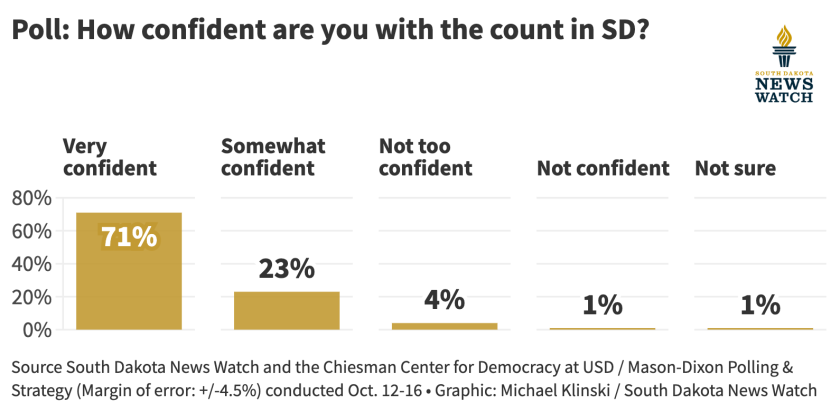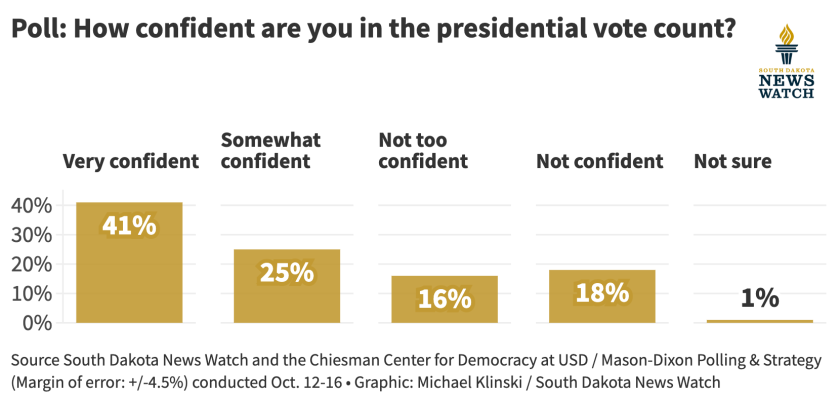The runup to a major election can be a hectic time for election officials, whose tasks include training poll workers, testing tabulators, processing absentee ballots and providing voter information.
This year, in the final days before South Dakotans head to the polls Nov. 5, the stress level is higher than usual.
“Things are more contentious,” said Pennington County Auditor Cindy Mohler, who supervises elections in the state’s second-largest county in Rapid City. “I feel like at every turn we don't know what's going to be thrown at us, and so you're a little apprehensive to let your guard down.”

Recent trends in South Dakota election law have broadened access for poll watchers and observers – who are allowed to monitor voting and counting activity – without increasing protections for poll workers and election officials, raising concerns about potential harassment, intimidation or interference.
Nationally, the U.S. Department of Justice’s Election Threats Task Force has arrested and prosecuted about 20 individuals for threatening election workers since its inception in 2021, a small fraction of cases reported by local officials.
There are several reasons for election angst in South Dakota, starting with the political climate. The state has seen a rise in electoral activism sparked by unfounded claims of voting irregularities in the last presidential election, predominantly from populist Republicans lamenting Donald Trump's 2020 defeat.
Seeds of doubt from Trump and his followers spawned activist organizations such as South Dakota Canvassing Group, whose founders were inspired by My Pillow founder and conspiracy theorist Mike Lindell’s 2021 Cyber Symposium in Sioux Falls.
The grassroots appeal of these efforts had enough sway in South Dakota to motivate state legislators to pass election security measures such as mandatory post-election audits and the banning of unmonitored drop boxes.
"There's a lot to celebrate in South Dakota," said Rick Weible, a computer analyst and Canvassing Group adviser who is among the state's most influential electoral activists. "Transparency is the inoculation to all conspiracy theories, and having more public and bipartisan oversight of elections is always a good thing."
Poll shows confidence in local elections
Though national rhetoric about election integrity has impacted South Dakota politically, it has not eroded confidence in the accuracy of local elections, according to a poll of 500 registered voters co-sponsored by News Watch.
The statewide survey, also sponsored by the Chiesman Center for Democracy at the University of South Dakota, was conducted Oct. 12-16 by Mason-Dixon Polling and Strategy.

It showed that 71% of respondents were “very confident” that votes will be counted accurately in the 2024 election in South Dakota, while 23% said they were “somewhat confident,” for a total of 94%.
When the same group of registered voters were polled about the 2024 presidential election, just 41% said they were very confident that the results would be accurate, while 25% said they were somewhat confident, for a total of 66%.
Broken down by party registration, just 21% of Republicans said they were “very confident” that the race between Trump and Democratic Vice President Kamala Harris will be counted accurately, compared to 75% of Democrats.

Minnehaha County auditor stirs controversy
Some of the most brazen challenges to the status quo of South Dakota election systems have come from the state’s largest county, Minnehaha.
Republican Leah Anderson, the county auditor elected in 2022, has spoken at South Dakota Canvassing events and embraced some of the group’s core initiatives while raising doubts about the accuracy of past election results.
Anderson directed that Minnehaha County conduct a full post-election audit of more than 13,000 ballots from the June 25 primary by hand count, despite state law only requiring 5% percent of precincts be audited.
The process took about 11 hours, more than double what Anderson had estimated. Most races were within a single vote difference between the tabulation count and hand recount.
Anderson also said in a press release and on Lindell's podcast that roughly 24,500 ballots were potentially unaccounted for from the 2020 election in Minnehaha County. She later conceded that the number was closer to 283 and that she was "comfortable with the number of ballots cast" based on boxes of records she found.
Debate over wearing political apparel to polls
For the Nov. 5 election, Anderson has amended Minnehaha County regulations to allow political campaign apparel to be worn to the polls, a position that runs counter to South Dakota Secretary of State election policy.
Supporters of the move point to a 2018 U.S. Supreme Court decision in which the court struck down a Minnesota law that prohibited voters from wearing politically themed apparel such as T-shirts, buttons or hats to the polls. The case stemmed from 2010, when a man was temporarily prevented from voting because he was wearing a T-shirt with a Tea Party logo and a "Please I.D. Me" button.
The court's 7-2 ruling stated that Minnesota's law violated the First Amendment because it was overly broad, recommending that the state put forth a “more discernible approach” to what is forbidden and what is not.

The Minnesota Secretary of State's policy, based on the new law, is more detailed in disallowing “campaign T-shirts, buttons or literature which relate to specific candidates, official political parties, or ballot questions on the ballot that day.”
Asked by News Watch if Minnehaha County’s policy will allow political apparel connected to 2024 candidates or ballot measures, Anderson deferred to Haggar, the state's attorney, who indicated that such items would be allowed under the revised rules.
"As long as individuals are not actively campaigning or actively attempting to solicit votes for or against a candidate or ballot measure, our priority is to protect every registered voter’s right to vote," Haggar told News Watch via email. "Any person who is actively campaigning or disrupting the polling place will be asked to cease or to leave.”
Minnehaha County's directive runs counter to state election officials' interpretation of South Dakota Codified Law 12-18-3, which prohibits a person from displaying "campaign posters, signs, or other campaign materials" at a polling place or within 100 feet of the entrance to the site.
In an email to county auditors addressing Minnehaha County's decision, Christine Lehrkamp, deputy elections director, said that “this office has advised for many, many years that there may be no campaign material within 100 feet of any entrance to a polling location and also no voter may wear campaign material into the polling location. The Secretary of State’s office will continue to follow state law and continue to advise you all to follow state law unless we have a court opinion specific to South Dakota that our law is unconstitutional.”
EDITORS NOTE: This story first appeared on https://www.sdnewswatch.org.


